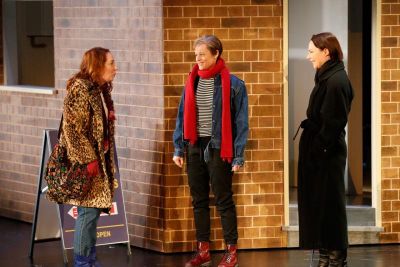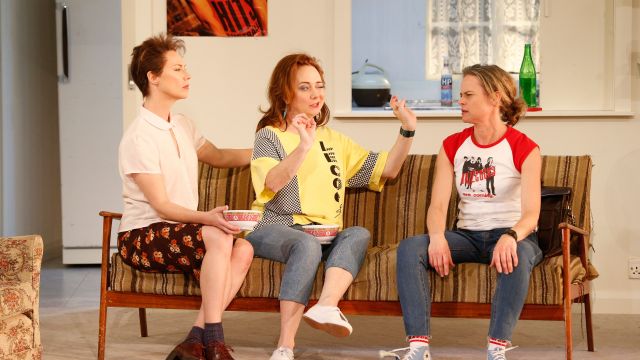Di and Viv and Rose
Three young women, university freshers, move into a share house: Di (Nadine Garner), a sporty lesbian business student, bursting with energy, Viv (Belinda McClory), a judgemental, driven, ambitious design student intent on escaping her roots, and Rose (Mandy McElhinney), more middle-class, insouciant, a student of Art History. It’s the early 80s. Their friendship, over the next twenty-seven years, is the subject and the heart of this light but amusing and entertaining show. It’s made all the more entertaining by this cast, who individuate their characters beautifully. Ms McClory as the prickly Viv never tries for our sympathy, but earns it anyway. Ms McElhinney plays her Rose as an airhead, but so generous and sweet that we love her as do – eventually - her flatmates. Ms Garner’s contrast between matter-of-fact bedrock and touching personal uncertainty is seamless. All three are in their 40s, enabling them to grow older convincingly across the play’s time-frame – something stipulated by the playwright.
The text is sometimes mildly shocking in its female frankness, but there is no sentimentality. Rose sleeps around, in a happy-go-lucky, so-sensual-it’s-almost-spiritual way – but there are, eventually, consequences. Viv’s drive and focus is rewarded. And Di, who is rather shy under her forthrightness (and hasn’t come out to her mother), finds someone to love. After a near sit-com set-up for all three, darker elements enter the women’s lives – it’s not all sunshine and flowers. There are fierce, wounding arguments, misjudgements, violation, pain and disease. But the friendships and the despite-everything loyalty survive in the way first friendships away from home do.
 This is a play that has been warmly received (with some serious reservations) elsewhere, and has had productions in Israel, Poland, Germany and New York. Without diminishing the achievements and commitment of the cast, why then does this production reveal its flaws? And there are flaws. As the play covers such a long time-span, things are set up and then disappear. For example, Di is really keen on another girl and finally manages to get a date with her, and then… That’s it. On with the next episode in the women’s lives. Something horrific happens in the first act; tears are shed, comfort is given, but then we move on again without, it seems, residue. The second act seems far more bitty than the first – and it goes on with a lengthy scene of catch-up exposition and new conflict well after the audience is pretty well convinced the show’s over.
This is a play that has been warmly received (with some serious reservations) elsewhere, and has had productions in Israel, Poland, Germany and New York. Without diminishing the achievements and commitment of the cast, why then does this production reveal its flaws? And there are flaws. As the play covers such a long time-span, things are set up and then disappear. For example, Di is really keen on another girl and finally manages to get a date with her, and then… That’s it. On with the next episode in the women’s lives. Something horrific happens in the first act; tears are shed, comfort is given, but then we move on again without, it seems, residue. The second act seems far more bitty than the first – and it goes on with a lengthy scene of catch-up exposition and new conflict well after the audience is pretty well convinced the show’s over.
In an interview with Ms Bullmore, included in the program, she says she’s been asked ‘to do it on TV… but it’s a play, it’s a play, it’s a play’. (Ms Bullmore knows very well what television is – and good television too: she has written numerous episodes of the much-loved Scott & Bailey - amongst other things - as well as playing the eponymous characters’ boss.) Nevertheless, Di and Vic and Rose in this production does feel rather like television – although television would have more cause-and-effect plot and less ‘illustration’.
 It’s a play that needs pace and momentum to keep us engaged with the women’s lives because that’s all this play is – the outside world doesn’t impinge except on the most personal level, as if these characters are insulated from the strife of Britain’s 80s, 90s and into this century – but maybe that’s accurate for these particular characters and Ms Bullmore has made a deliberate choice to focus exclusively on personal experiences with which audiences, especially women, will identify.
It’s a play that needs pace and momentum to keep us engaged with the women’s lives because that’s all this play is – the outside world doesn’t impinge except on the most personal level, as if these characters are insulated from the strife of Britain’s 80s, 90s and into this century – but maybe that’s accurate for these particular characters and Ms Bullmore has made a deliberate choice to focus exclusively on personal experiences with which audiences, especially women, will identify.
But director Marion Potts and designer Dale Ferguson have decided to use enormous sliding black screens that frame, un-frame, mask and unmask areas of the stage. (The things you do when you have a big budget.) As the screens trundle slowly across the stage and descend from above, momentum and our involvement die.
No doubt, however, audiences will see past or through curious production decisions and the bit-of-this, bit-of-that text – the opening night audience certainly appeared to – and respond to and feel for and laugh with these three characters so ably and warmly played by these three terrific – and perfectly cast - actresses. Di and Viv and Rose is a smart commercial decision by the MTC: it’s a crowd-pleaser that could perhaps be rather more pleasing than it is.
Michael Brindley
Photographer: Jeff Busby
Subscribe to our E-Newsletter, buy our latest print edition or find a Performing Arts book at Book Nook.

